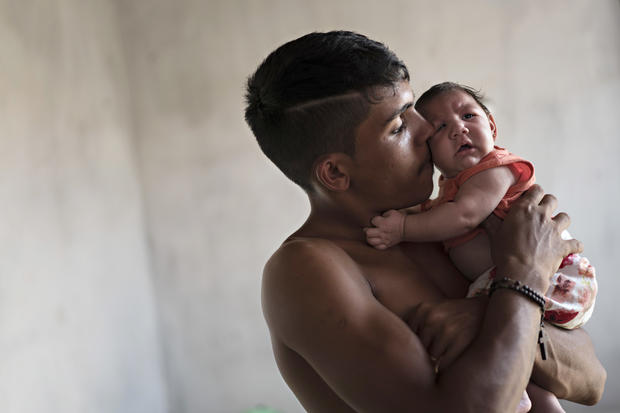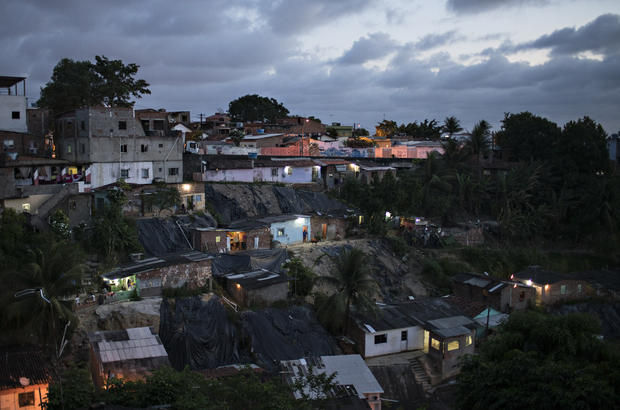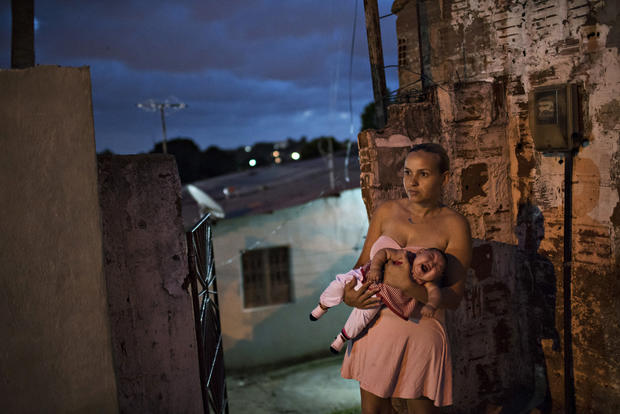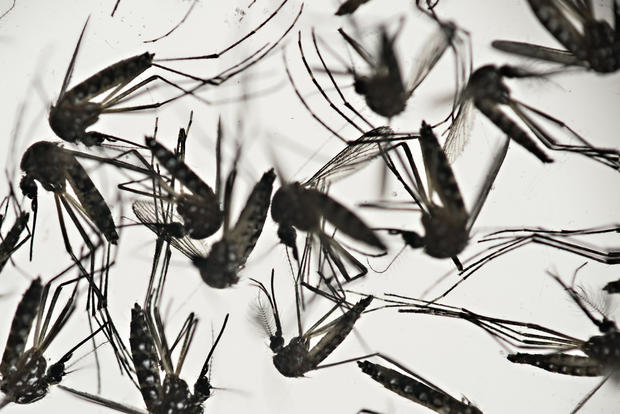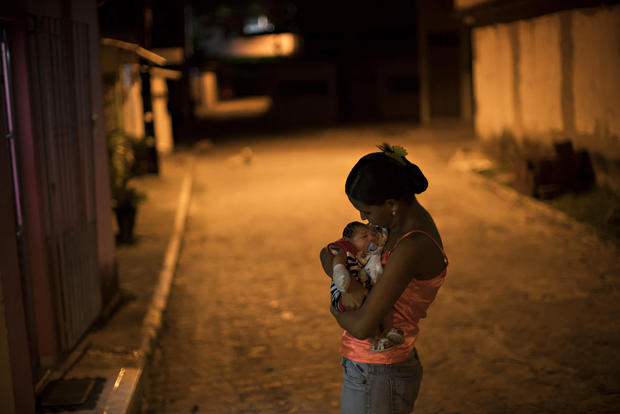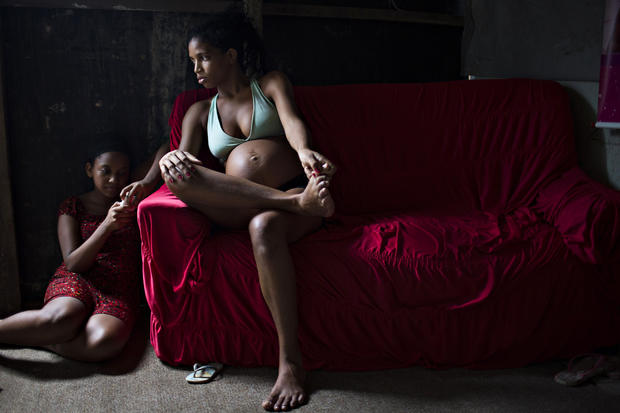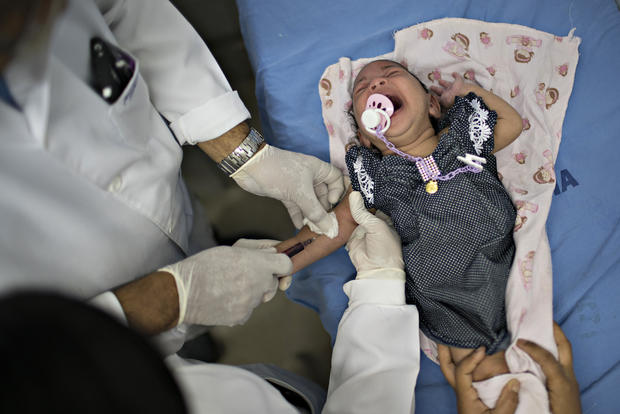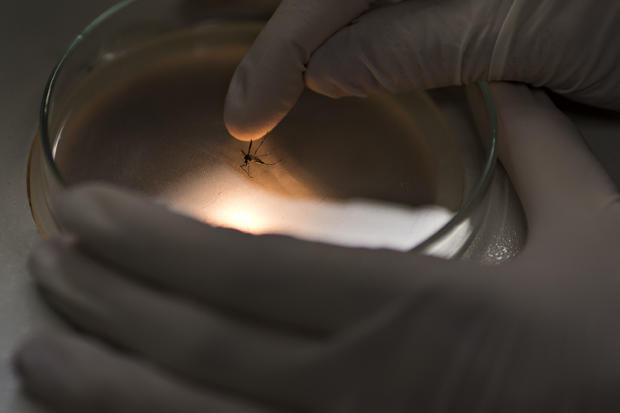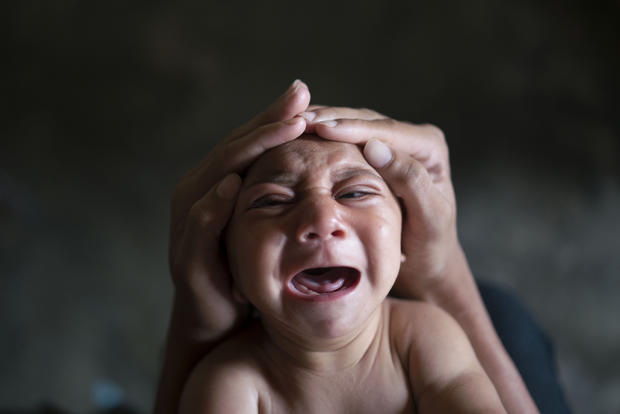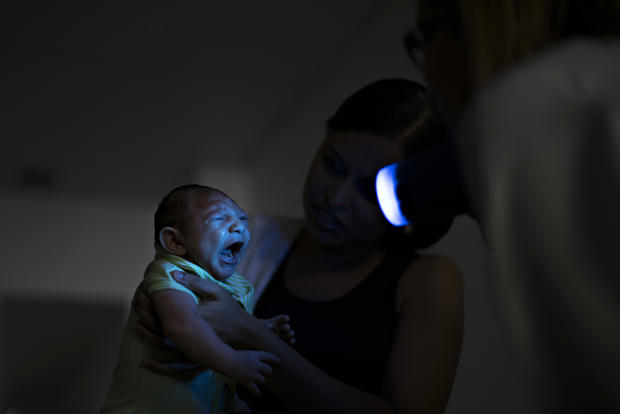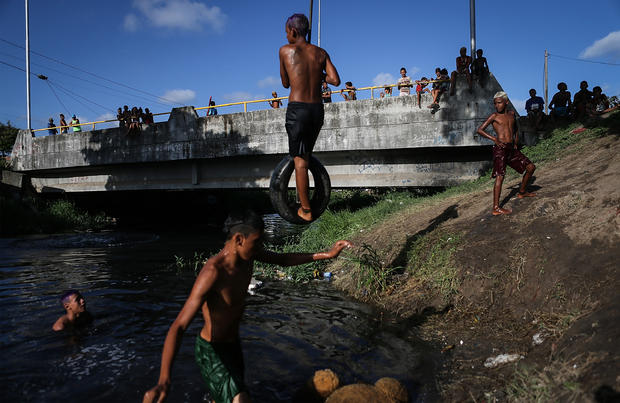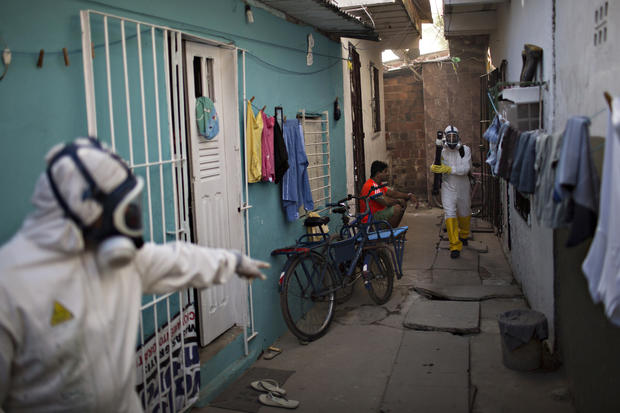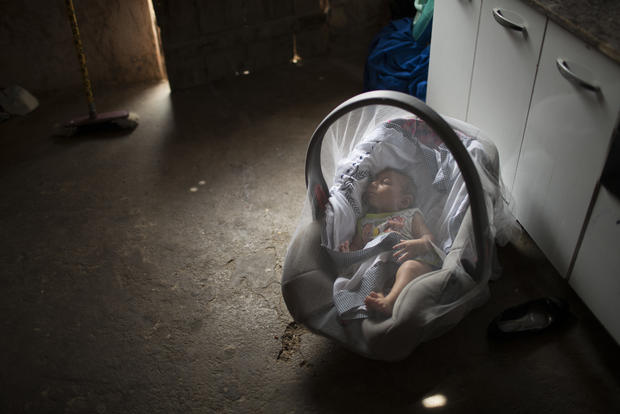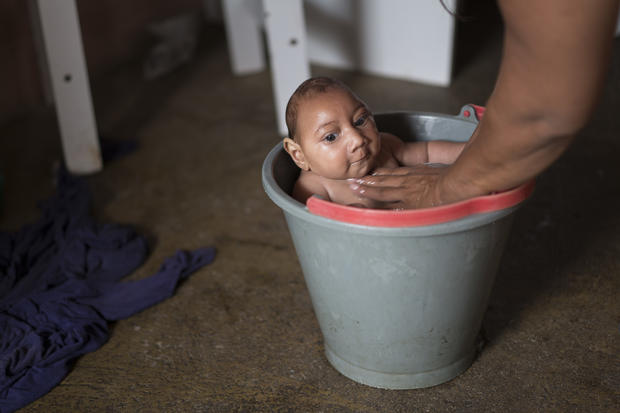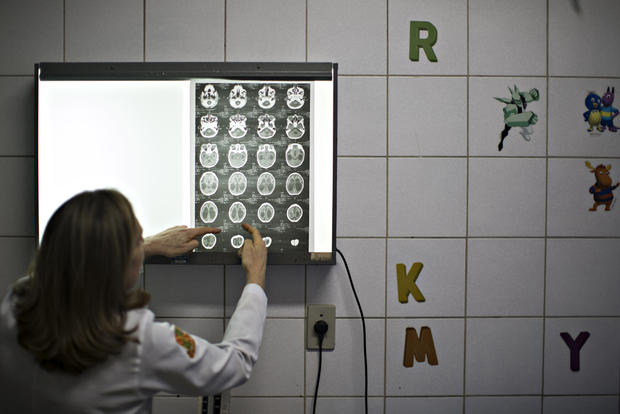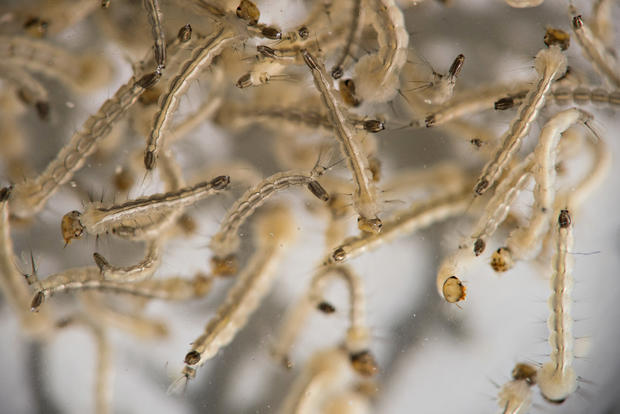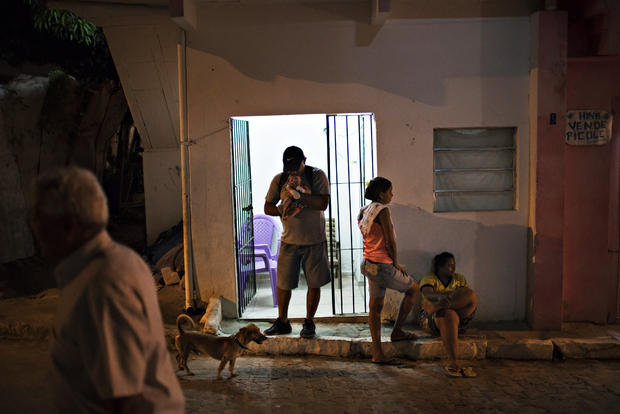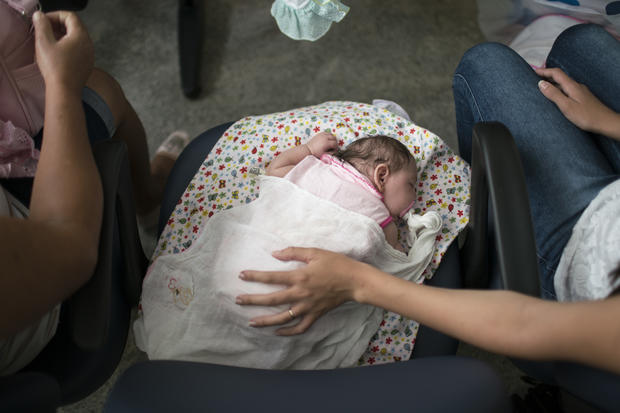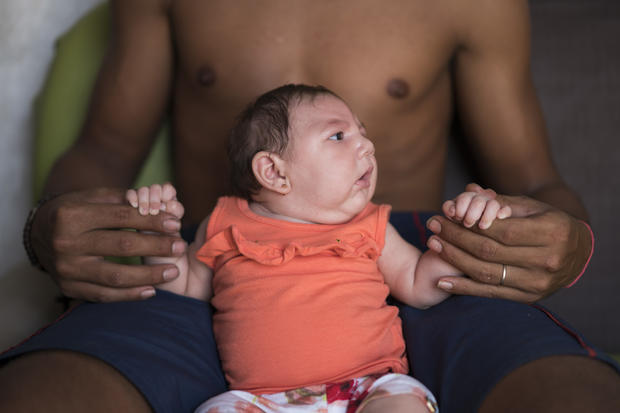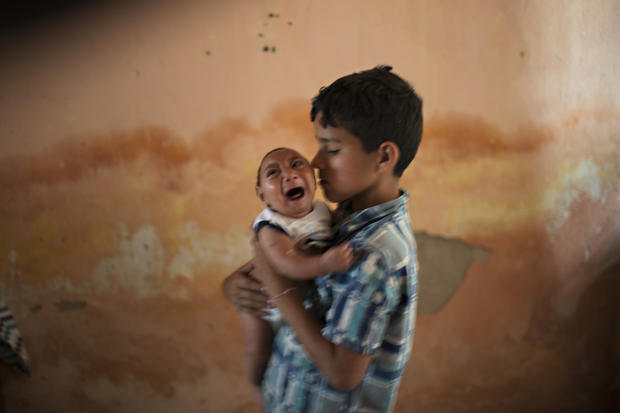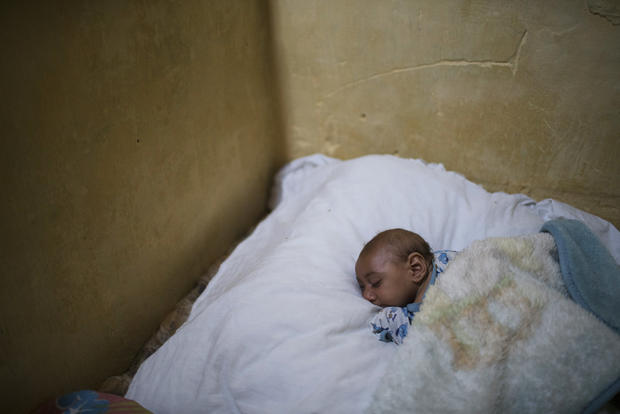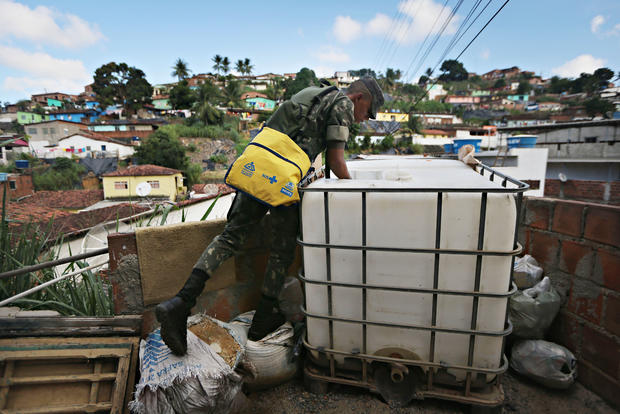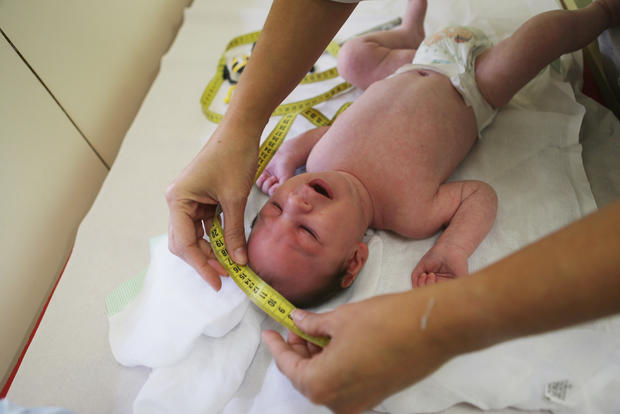Zika virus takes heartbreaking toll
The Zika virus is thought to have arrived in Brazil in 2014 during the World Cup soccer tournament. By 2016, the outbreak exploded -- with estimates of at least 1.5 million people infected in Brazil alone. The virus led to an increase in cases of microcephaly -- children born with unusually small heads and often brain damage.
In this photo, Dejailson Arruda holds his daughter Luiza at their house in Santa Cruz do Capibaribe, Pernambuco state, Brazil, Dec. 23, 2015.
Zika virus
Homes are lit by the setting sun in Ibura, one of the neighborhoods with the highest numbers of suspected cases of children born with microcephaly in Recife, Pernambuco state, Brazil, in 2016.
The Zika virus is spread by mosquitoes or through sexual contact with an infected person.
There is no vaccine and no treatment for Zika virus.
Zika virus
Gleyse Kelly da Silva, 27, holds her daughter Maria Giovanna, who was born with microcephaly, outside their house in Recife, Pernambuco state, Brazil, Jan. 27, 2016.
Living in Recife, in Brazil's northeast, residents are at the epicenter of the Zika outbreak.
"In Brazil, infestation rates (of the Aedes aegypti mosquito) are highest in the northeast because of climatic reasons and socio-economic reasons, so it makes sense that ... it really took off there," explains Dr. Albert Ko, a professor of a professor of epidemiology with the Yale School of Public Health, "It's the proverbial perfect storm."
Zika virus
Aedes aegypti mosquitoes sit in a petri dish at the Fiocruz Institute in Recife, Brazil.
Originally from Africa, Zika spread to Asia and was first registered in Brazil in the spring of 2015, spreading like wildfire through the northeast due in part to the region's widespread poverty, equatorial heat and chronic infestations of the Aedes aegypti mosquito, which also spreads dengue fever and chikungunya.
Zika virus
Daniele Ferreira dos Santos holds her son Juan Pedro, who was born with microcephaly, outside her house in Recife, Brazil, Jan. 26, 2016.
Around the fifth month of her pregnancy, Ferreira dos Santos fell ill with a high fever and angry red splotches on her skin. She soon recovered.
Weeks later, when she went to the hospital for a prenatal exam, the news was horrific: The baby she was carrying likely had a severe brain injury. When Juan Pedro Campos dos Santos was born in December 2015, the circumference of his head was just 26 centimeters (10.2 inches), about 20 percent smaller than normal.
Santos was never diagnosed with Zika, but she blames the virus for her son's birth defect and for the terrible toll it has taken on her life. Thousands of confirmed or suspected cases of microcephaly in Brazil may be connected to the virus.
Zika virus
Tainara Lourenco, five months pregnant, sits inside her house in a slum in Recife, Brazil, Jan. 29, 2016.
She can't afford mosquito repellent, which skyrocketed in cost because of the outbreak. The government has pledged to start providing repellent to low-income women and promises to deploy the armed forces to help eliminate mosquitoes' breeding places.
Zika virus
A doctor draws blood from Luana, who was born with microcephaly, at the Oswaldo Cruz Hospital in Recife, Brazil, Jan. 28, 2016.
Brazilian officials saw a sharp increase in cases of microcephaly about a year after Zika virus was first identified in the country.
Zika virus
A researcher places an Aedes aegypti mosquito on a petri dish before analyzing it through the microscope at the Fiocruz Institute in Recife, Brazil.
In 2016, Brazilian authorities warned women to postpone pregnancy because of Zika's possible risk to their unborn babies. The U.S. Centers for Disease Control and Prevention urged pregnant women to consider avoiding travel to areas where Zika is present.
By 2017, Brazil's outbreak was largely over, though small numbers of cases continued to pop up.
Zika virus
Jose Wesley, seen here in January 2016, was born with microcephaly and screams uncontrollably for long stretches.
Jose's mother, Solange Ferreira, had never heard of microcephaly before her youngest son was diagnosed a couple of days after his birth in Pernambuco state, Brazil.
"There has never been an epidemic of Zika in the proportions that we are looking at now in Brazil," said Pedro Fernando Vasconcelos, a researcher at Evandro Chagas Institute investigating the connection between the virus and birth defects. By 2017, the outbreak had mostly subsided.
Zika virus
Daniele Ferreira dos Santos holds her son Juan Pedro as he undergoes visual exams at the Altino Ventura foundation in Recife, Pernambuco state, Brazil. Vision problems are common in children with Zika-related birth defects.
"The mosquito is in all Recife. If I didn't get it here, I got it at the place I work," said Santos, a receptionist. "We all know that the risk is high."
Zika virus
A young man swings off a tire into a polluted and slow-moving canal on Jan. 26, 2016 in Recife, Brazil.
Mosquitoes have long been an inescapable part in Recife's poorer neighborhoods, where raw sewage flows in ditches, rain water from the frequent downpours accumulates in fetid puddles, and the shores of a nearby pond are dotted with trash. Each soda bottle, yogurt container and margarine tub provides an ideal breeding ground for the Aedes aegypti mosquito, a vector for the Zika virus.
Zika virus
Gleyse Kelly da Silva holds her daughter Maria Giovanna as she sleeps in their house in Recife, Pernambuco state, Brazil, Jan. 27, 2016.
Dr. Ceuci Nunes, an infectologist at the Couto Maia Hospital in the northeastern city of Salvador, said regional officials' lax attitude toward mosquito eradication helped enable the insects' spread, leading to record numbers of cases of Zika virus as well as dengue fever.
Zika virus
Municipal workers spray insecticide to combat the mosquitoes that transmit Zika virus, in the Imbiribeira neighborhood of Recife, Brazil, Jan. 26, 2016.
Zika virus
Jose Wesley sleeps covered by a mosquito net in Poco Fundo, Pernambuco state, Brazil, Dec. 23, 2015. Jose struggles to feed, something common in children with neurological disorders like microcephaly.
His mother, Solange Ferreira, moved with baby Jose to Bonita, leaving her husband in their old village so she could be closer to the city of Recife to get therapy for her son.
Zika virus
Solange Ferreira bathes her son, Jose Wesley, in a bucket at their house in Poco Fundo, Pernambuco state, Brazil, Dec. 23, 2015.
Jose Wesley cries incessantly and Ferreira says her son enjoys being in the water. She places him in the bucket several times a day to calm him; a solution she learned from a nurse at the hospital.
Zika virus
Dr. Angela Rocha shows brain scans of a baby born with microcephaly at the Oswaldo Cruz Hospital in Recife, Brazil, Jan. 28, 2016.
Brazil once succeeded in virtually eliminating the Aedes aegypti mosquito, but in recent decades the mosquito population has resurged. The mosquito which spreads Zika virus is well adapted to humans, lives within people's homes and can breed in just a bottle cap of stagnant water.
Aedes aegypti mosquito larvae
Aedes aegypti mosquito larvae sit in a petri dish at the Fiocruz Institute in Recife, Brazil.
Massive eradication efforts in the 1940s and 1950s allowed the country to be declared free of the mosquito in 1958, but over the decades the insect returned, finding fertile breeding grounds in Brazil's sprawling, unplanned cities, with their limited plumbing systems and garbage collection.
Zika virus
Jennipher Karine looks inside a room as her brother Juan Pedro, who was born with microcephaly, undergoes exams at the Altino Ventura Foundation in Recife, Brazil, Jan. 28, 2016.
Zika virus
Daniele Ferreira dos Santos, center right, stands outside her house in Recife as her ex-husband holds their son Juan Pedro, who has microcephaly, in January 2016.
Almost from birth, Pedro cried ceaselessly, as do many babies with microcephaly. Her husband was annoyed by the baby's constant fussing, which distracted him from his television show, she said, and then within weeks of the baby's arrival, he left the house with the family's flat-screen TV.
Zika virus
Angelica Pereira comforts her daughter Luiza as she waits for their appointment with a neurologist at the Mestre Vitalino Hospital in Caruaru, Pernambuco state, Brazil, Dec. 22, 2015.
Luiza was born in October with a head that was just 11.4 inches (29 centimeters) in diameter, more than an inch below the range defined as healthy by doctors. Her condition, known as microcephaly, often results in mental retardation and developmental problems.
Zika virus
Dejailson Arruda holds his daughter Luiza at their house in Santa Cruz do Capibaribe, Pernambuco state, Brazil, Dec. 23, 2015.
Luiza's mother, Angelica Pereira, was infected with the Zika virus after a mosquito bite during pregnancy.
Zika virus
Elielson, 10, holds his 2-month-old brother Jose Wesley, who was born with microcephaly, at their house in Poco Fundo, Pernambuco state, Brazil, Dec. 23, 2015.
His mother, Solange, said, "Now I have started believing that it is actually the other babies that have heads to are too big. Jose is my new normal."
Zika virus
Jose Wesley sleeps over a large pillow on his mother's bed in Bonito, Pernambuco state, Brazil, Jan. 30, 2016.
The boy has lost weight, from 7 to 5 kilograms (15 to 11 pounds), a huge drop for a baby who should be growing.
Zika virus
A Brazilian Army soldier inspects a tank in front of a house in Recife in January 2016. Troops were canvassing the neighborhood in an attempt to eradicate the larvae of the mosquito which spreads Zika virus, while informing the public of preventive methods.
"Because of irregular water distribution, many people, especially in poorer areas collect water in tanks ... creating ideal breeding grounds for the mosquitoes," said Dr. Ceuci Nunes, an infectologist at the Couto Maia Hospital in the northeastern city of Salvador. "The same goes with trash, which often goes uncollected."
Zika virus
Dr. Vanessa Van Der Linden, a neuro-pediatrician who first recognized the microcephaly crisis in Brazil, measures the head of a 2-month-old baby with microcephaly on Jan. 27, 2016 in Recife, Brazil.
The baby's mother was diagnosed with having the Zika virus during her pregnancy.
